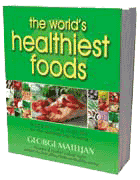As you introduce solid foods to your baby, you begin to shape eating habits that will be with him or her throughout life. Why not give your child the gift of health using the World's Healthiest Foods as the foundation of your child's diet (and yours as well!)?
In the aisles of any supermarket, you'll find a wide range of baby food choices. Unfortunately, most brands of baby food contain sugar, salt, artificial colors and preservatives, and the few brands made with organic ingredients are so expensive! Fortunately, many delicious, healthy baby foods can be easily made at home for much less than the cost of even non-organic baby foods at the store. Your homemade baby food will be much fresher, taste better, and be significantly healthier for your baby at a fraction of the cost!
For the first year of life, solid foods should supplement, not replace your breast milk, which is the most important food for your baby. Not only is your breast milk the best food to meet your baby's nutrition needs, but it's much less likely to provoke colic, and it provides your baby with the immunity you have developed to many common illnesses.
It's also important to remember that with each passing month, your baby's digestive tract becomes more mature and better prepared to appropriately digest solid foods. A growing body of scientific evidence suggests that introducing foods before your baby's digestive system is ready to digest them can cause allergic reactions, resulting in a variety of chronic conditions including skin conditions, sinus problems, and asthma.
By limiting the number of foods you introduce before your child turns a year old, you can greatly reduce the chance that he or she will develop any allergies later in life. Introduce new foods slowly, trying one food at a time, and waiting several days to be sure it agrees with your baby's developing digestive system.
In addition to breast milk, some time around 6 months of age, your baby will let you know she or he is ready for more. If s/he can sit up by him/herself and can push objects away from him/herself, your baby may be ready to eat something besides breast milk or formula. And, of course, if your child has weaned him/herself from the bottle, you are definitely ready to introduce solid foods.
Now is the time to start introducing some vegetables, fruits, and a small number of grains including rice, barley and oatmeal, all of which can be steamed, then puréed into the easy to swallow, buttery smooth consistency of store-bought baby foods. Your homemade foods, however, will be fresh, will not be overcooked, and will retain more nutrients and supply more flavor-naturally.
Begin with vegetables; your baby will be more likely to eat these if s/he learns to enjoy them before making the acquaintance of, naturally sweeter, fruits.
At 6 months, begin introducing your baby to the following fruits and vegetables:
- bananas
- pears
- applesauce
- avocado
- cooked yams
- cooked carrots
Puréed foods are only needed initially. By 7 months, most of your baby's foods can simply be mashed, which will encourage his or her developing chewing skills.
At nine 9 months, your child may be ready for a little more variety. Try adding:
- mashed potato
- puréed string beans
- peaches
- cooked mashed peas, beans (except for soybeans) or lentils
- puréed salmon
Nine months is also the time to beging introducing grains. Start with:
- brown rice
- oatmeal
At 12 months, your child's digestive system may be ready to tackle the potentially allergenic proteins in dairy and soy foods. Try yogurt, and some infants love tofu.
Remember to offer clean, pure water-a much healthier choice for your baby's teeth than fruit juice. If giving fruit juice, always dilute at least half and half with water, and never put your baby to bed with a bottle of milk or juice as this promotes tooth decay.
Most importantly, have fun, be patient and focus on providing healthy, nutrient-dense foods. Allow your child the delight of the unadulterated flavors of real food; skip the added salt and sweeteners-especially honey, which should not be consumed by children under age one!
Once your child is eating solid foods along with the family, remember, some foods can be choking hazards for children untl they reach at least 4 years of age, including:
- hard foods, such as nuts, seeds, raw carrot pieces
- hard to chew foods, such as corn, popcorn
- foods whose size and shape could be inhaled or swallowed whole and block the airway (such as grapes, chunks of tofu hot dogs, etc.) Cut any such foods in quarter lengthwise before giving to a young child.
Setting your child's first baby steps on the path of healthy eating is the best start you can provide for a lifetime of vibrant health. And, since children imitate their parents' eating habits, you may find yourself inspired to set the best example possible, which we hope we can make not only easy, but delicious for you at the World's Healthiest Foods.






